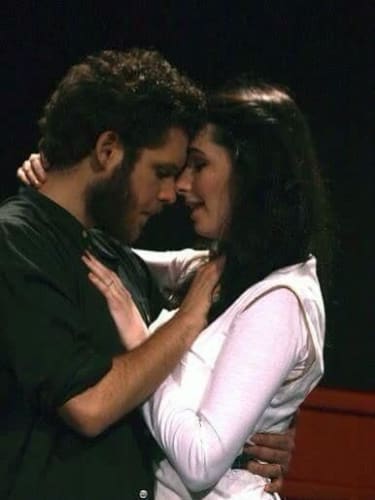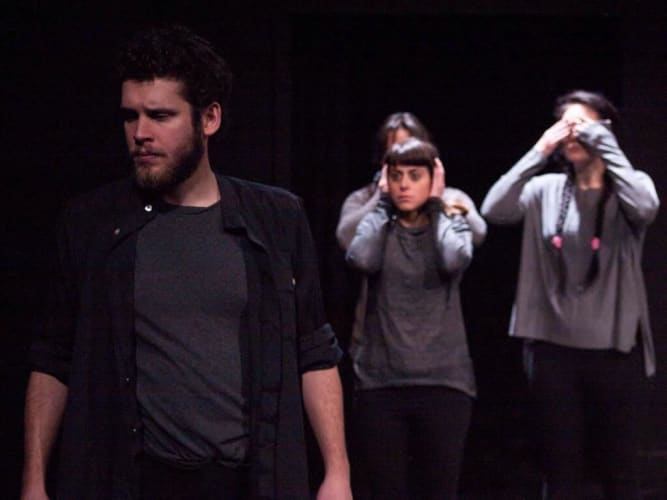Sparsely and boldly staged by director David Shopland this production of The Scottish Play sends its audience into a darkened auditorium lit by a few harshly directed spots. In the depths of the black stage, two shadowy figures stand ominously sentinel, a promise perhaps of pressures to come that may impinge on them directly.
A panel opens up above the stage and Macbeth, stripped to the waist, kneels over a red fire bucket laving himself as in a ritual cleansing. A hint, to say the least, that we are to see a play that is about guilt.
A string of notes in a repeated theme builds in intensity and then the lights are all extinguished. The stage is certainly being set for significant drama and when the lights come up on a single red box-like stool downstage, there is a sense that this will be clear cut and explicit.
A trio of pig-tailed females, squeaking, giggly schoolgirls, rush on, throwing on more red boxes and dragging a folding wallpapering table which they arrange as a throne. The stage and style are set by these three witches who then bring the two dim figures forward and pose them.
This tale of regicide and retribution is under their control and now it can begin. There is no scenery; the actors are barefooted and their costumes look like practice clothes, though carefully selected, in black, white, creams and shades of grey.
A sash that is almost tartan identifies the Scottish King and paper crowns stand in for golden diadems. This, as a message in the programme declares, is a production that “employs simplicity and starkness to strip the story back to the text.” That is both Shopland’s production’s virtue and its problem.
Concentration on the text and language gives the play focus but to be effective demands it be delivered with clarity and understanding. In too many places, voices are blurred or speech too fast for comprehension and at times words are spoken without thoughts behind them. A bare stage and this theatre may produce a difficult acoustic—but I saw this play at the end of its London run, plenty of time for director and actors to sort out any problems.
Fortunately, Andrew Venning’s Macbeth posed no such problems. It is not only well spoken; it is played with understanding. That opening image of cleansing is a statement for the whole production and Venning clearly shows us when guilt first kicks in and offers a whole arc of reaction to his situation, whether brought on by himself or by witchcraft.
There are times in the early scenes when he over punctuates with pauses but his is one of, possibly the best rendering of the “Tomorrow and tomorrow” speech reacting to his wife’s death that I have encountered (and I have seen quite a few): the audience completely held for a long pause on “signifying nothing”.
This Lady Macbeth is more shallowly presented. When we first see them together, Macbeth sneaking up behind to give her a surprise embrace, there is a physicality on his side of the relationship that in her is muted. Lady Macbeth has been a mother but they now appear to have no children. If this is a woman emotionally damaged by the loss of their child, the production gives Carmella Brown little help in putting the point over making her performance seem too bland.
Banquo is sharply characterized but as an almost comical character gesticulating camply: an unconventional way of presenting one of Scotland’s leading generals—but very Scots (though only he and Lady M have Scottish accents). In contrast, Lawrence Boothman plays his ghost with calm accusing stillness in a very simple staging that is very effective.
Putting the witches in control is not a new approach but Shopland handles it with imagination, though these actresses are so busy creating each environment that they speak mainly an incomprehensible gabble. This might not matter for their incantations and, since one witch (Caroline Charles) is also a beautifully clear Lady Macduff, this may be by choice but it adds to the lack of clarity elsewhere.
There is a very assured performance from Tony Eccles as the comic Porter but, though Shakespeare presumably wrote it for one of his company’s clowns, with its catalogue of sinners it is also a reminder of hellfire, for the Macbeths or for Duncan, and its verbal humour here is overlaid by drawn-out, drunk clowning. It holds the play up instead of being a brief respite from taut drama, though it was a definite pleaser for some sections of the audience.
Despite occasional misjudgements, there are interesting ideas here and Shopland enterprisingly takes the action out into the audience, but it is a relatively routine production around a strong central performance.
This production will also play the Rondo Theatre, Bath 4 to 7 March 2015.


